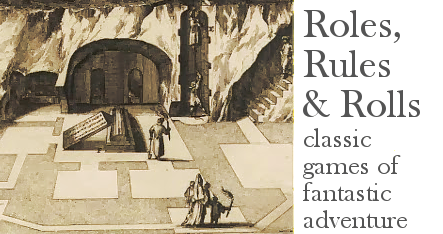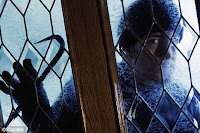Kind of old news by now, but while I was away from the blogosphere, my table submitted to the
Fight On! / Magician's Manse contest took an Elite Honorable Mention, and is headed for their Big Book of Tables. Its title:
What’s Happened To Those Dead Bodies You Left In The Dungeon Yesterday? So if you want to see it, hang tight until the BBoT comes out!
Has anyone done a table dealing with another common "what's happened" situation - leaving goods in a tavern room while you scour the dungeon? I seem to recall one somehow, somewhere, but it's not in the Links to Wisdom. The ransacking of my party's lair by NPCs
in the last session, albeit NPCs under the control of two of the players, brought this to mind. So here's my stab:
Roll d% first. The "happening" score is 1 if away up to 6 hours, 2 if away up to 12 hours, 3 if 24 hours, and +2 for each day thereafter (so 10 days is 23). You can also double or triple this number if in a particularly dangerous environment.
If the roll is equal to or lesser than the "happening" score then something may happen. Roll again on this table:
1-5: Your Biggest Fan, Stan: You have attracted an annoying would-be henchman to your doorstep, attracted by tales of your derring do. Negated if you have no reputation in the vicinity.
6-20: Amateur Thief, from outside inn. A light-fingered zero-level civilian passes by your room and can'r resist. Steals anything in view or in an obvious container, as long as it can be concealed in a pouch or tunic. Negated by: lock, watchdog, guard, vigilant innkeeper, concealment.
21-40: Amateur Thief, from inside inn. One of the fellow tenants gets a curious itch. Same as amateur thief, negated by lock, watchdog, guard, concealment, or if the party are the only tenants of the inn.
41-45 Inside Job. One of the employees of the inn has a similar idea. Negated by: lock (if party or innkeeper has key), watchdog, guard, vigilant innkeeper. Will look for concealed items, but not too hard.
46: Real Inside Job. The innkeeper is a crook. He/she schemes to rob the party but will set it up to look like a burglary, or will create a ruse to replace jewels with paste, good coin with counterfeit, magic items with ordinary and so on. This will happen over many inspections of the room, so that it will be difficult to conceal anything - especially with the keeper knowing the obvious hiding spots in his or her own establishment. Will try to get around watch animals or guards by ingratiation and bribery. Negated by: loyal guard, lock (if key is only with party).
47-50: Vandals. Anything from street urchins to wild baboons. They mostly want to destroy things but will run off with any coins that can easily be spent. Negated by: lock, watchdogs, guard, concealment, vigilant innkeeper.
51-60: Professional Thief. Take the maximum of (i) the "size category" of the settlement or road where the inn is located (where 1 is the loneliest village and 10 the hugest metropolis) and (ii) the party's highest level character. If that number or below was rolled on the "ones" die of the d% roll (60=10) the party has attracted a member of the thief class having character level equal to the number rolled. The thief will try climb, sneak, pick locks, disarm traps, drug or distract dogs, search for concealed goods, all at the appropriate skill level. He or she will, if successful, get away with the most portable and valuable of the party's goods. With this and all other thief results, play out the thief's assulat against the defenses.
61: Training Day: A first level apprentice thief backed up by a 11-16th level master. As above, but the master is able to intervene if anything happens to the apprentice.
62: Master Thief: If any member of the party is 5th level or above, an 11-16th level master thief comes calling. Very thorough and discerning in what gets taken away. May pay several visits to prepare the scene, create duplicates of magic items and jewelry, etc.
63: Larcenous Wizard: As 62, but a 3rd or higher level party attracts a 5-10th level magic-user gone rogue who knows all the right spells (spider climb, sleep, knock, you name it ...)
64-69: The Law: Agents of the local law enforcement, Inquisition, mages' guild or what have you demand to search the premises for contraband or black magic. If you locked the place, they bring crowbars and axes. If you have a dog, they'll bring five. Negated by: Being on good terms with local government, having no mysterious artifacts or unpaid taxes.
70: Crooked Law: As above, but a cop who bends the rules to declare your stuff illegal. Negated by: Good terms with local government.
71-77: Enemy Action, Larcenous: If you have any local enemies, they show up to steal stuff from your room (on 1d6, they have a thief on 4-5 and a magic user on 6). They will do a basic search, otherwise acting like a thief from the 51-60 result. Negated by: Not having any enemies.
78-80: Enemy Action, Devious: As above, except they are looking to plant stuff in your room, and then alert the law or other authorities. On an 80 the plan is truly devious and may involve sabotage of equipment or introduction of a malevolent being...
81-84: Enemy Action, Murderous: As 71-77 except they have broken into your place in order to ambush and kill you.
85-86: Mistaken Identity. Roll a d20 and add 64. The agents from that roll on this table are supposed to be targeting the room next door but chose yours by mistake or misdirection instead. Ignore if you are the only tenants of the inn.
87-92: Rodents. They have dug into your room and anything they can gnaw to in order to get to food, will be gnawed. Paper and leather are considered food by these rodents. Negated by: Very posh inn, cat in room.
93: Wererats. First they act like Rodents (above), then they turn into human form and act like thieves (51-60).
94: Wee Folk Tricksters. Leprechauns, brownies, jermlaine, mites, snyads, whatever. They'll go crazy setting up an elaborate practical joke on you, cruel or otherwise. Negated by: City or bigger settlement.
95: Smoke on the Water! The inn burns.
96: Rains and Flood! If your room is on the ground floor or top floor (in a cheap inn with a leaky roof), your goods take water damage.
97: Go Ape! If your room has a window, and you're in a city or metropolis, an escaped menagerie or circus animal enters and makes the place its home.
98: Profuse Apologies: A set of very important individuals (criminal gang if staying at a lowlife inn) has commandeered all rooms in the inn. Not to worry, though, the landlord has gathered all your visible belongings and is holding onto them, and offers a double refund of your night's stay. There is a problem if you have hidden anything in the room though...
99: Keep Out! The inn has been sealed off by the local authorities as a disease quarantine, crime scene, or just because the landlord is in debt. Your goods are under the watchful eye of the city guards for the indefinite future.
00: An Anonymous Gift: Oh, and here's something nice. A sack of gold, a magic item, a basket of fruit and bottle of wine. Just sitting there in your room, or in front of your room if it was secured. Honestly, it's not sabotaged ... not at all ...
Suggestions for additional entries that can be wedged in are welcome!


















